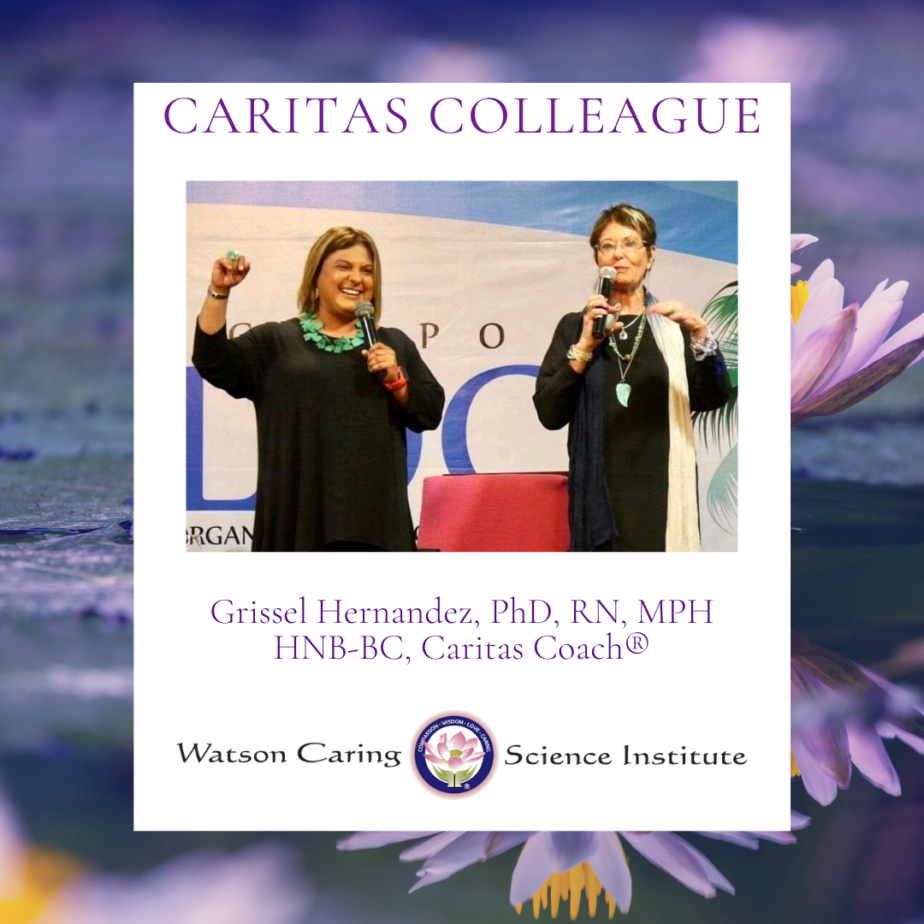December 2020
We continue to highlight our Caritas Colleagues and share their contribution and commitment to Caring Science. This month we are celebrating: Grissel Hernandez, PhD, RN, MPH, HNB-BC, Caritas Coach®.
Areas of Expertise
Grissel Hernandez is a nationally board certified holistic nurse and Caritas Coach®. She is the Executive Director for the Center for Education and Professional Development (CEPD) at Stanford Health Care in Palo Alto, CA. Grissel has over 20 years’ experience in clinical practice, nursing administration, nursing professional development, holistic nursing and public health in ambulatory, Magnet and Baldrige designated acute care facilities. She has expertise in the operationalization and integration of Watson Caring Science theory into professional practice and nursing professional development programs. Founding member of Regional Caritas Consortiums in NY/NJ/PA. Grissel serves as an Accreditation and Pathway to Excellence Appraiser for the American Nurses Credentialing Center’s Commission on Accreditation (ANCC).
Contributions to the Legacy of Caring Science
My Caring Science journey began 25 years ago, during my undergraduate nursing program at University of Pennsylvania. While I barely understood the core concepts and philosophical underpinnings of Jean Watson’s Caring Science theory, organically, the theory resonated and aligned with my reasons for becoming a nurse. From that moment, Caring Science theory became my philosophical and ethical-moral compass, informing my nursing student experience and, eventually, my future nursing professional life.
Caring Science reconnected me with the moral and ethical dimensions of caring in nursing, reminding me that as a nurse, I have a social covenant with the public to advocate for my patients and, above all, preserve their humanity and dignity.
Moreover, Watson’s Caring Science strong emphasis on caring for the caregiver gave me permission to slow down, engage in mindful self-care practices, and become a much better version of myself as I engaged with others. The theory’s core principles and Caritas Processes® (Watson, 2008) informed my varied nursing roles, including student, direct patient care provider, educator, and administrator. My journey with Caring Science extended beyond my professional nursing career into personal experiences, which transformed the way I viewed nursing as a consumer. My journey with Caring Science began with my parents’ experiences with cancer diagnosis and treatment in the United States and in Puerto Rico, my own experience with cancer at age 38, and finally, more recently, the untimely death of my beloved husband, John, at age 53 of a heart attack and my mother at age 72 of complications from sepsis.
Through these experiences, I found myself grieving as a wife, daughter, patient, and nurse healer. At times, it was difficult to separate all four. Luckily, I had a practice rooted in Caring Science to help me re-frame and make sense of my feelings. I was determined to use these experiences as examples of how to be a better nurse. My theory-based practice informed by Caring Science began in nursing school and continues to this day. In my multiple roles as direct care nurse, childbirth educator, clinical educator, and executive director, I integrated the theory into patient care and nursing educational activities, including nursing orientation, preceptor development, new nurse residency program, nursing leadership development program, and my nursing leadership practice.
These experiences led me toward a deeper appreciation and exploration of Caring Science, caring in nursing leadership, and the role of nurse leaders in creating a caring, healing environment for their staff within the context of a healthcare organization. For this reason, the next step on my Caring Science advanced studies journey was to pursue and complete my PhD in nursing from the University of Colorado, College of Nursing in the Caring Science track. The intent was to describe and understand the lived experience of creating a caring, healing environment for staff from the perspective of nurse leaders practicing within Watson Caring Science framework (aka. Caritas Coaches®). In the process, the universal essence of the phenomenon emerged: Creating a caring, healing environment for staff is the embodied, caring-loving consciousness engaged in informed, moral actions and practices. The findings in this study provided a window into an evolved way of leading.
This qualitative study created a deeper understanding of nurse leaders’ experiences and elements that reflect an evolved leadership practice guided by caring-loving consciousness. The study added to the evolving Watson Caring Science theory-guided research and translation into practice. The Caring Science theory-guided research findings will serve as a foundation for the creative emergence of a Caritas Coach Leader theoretical model for practice integration that can serve as a framework for an organizational-wide Caring Science integration strategic plan. I hope the findings spark a much needed and honest dialogue about the role theory-guided education, practice, and research have in creating caring, healing environments that support humanistic care and promote human flourishing. I consider this my life’s work.
Finally, the most meaningful way I am preserving and promoting the legacy of Caring Science is by the establishment of the John Matthew Kertland Scholarship (DONATE) at WCSI for the Caritas Coach Education Program®. The scholarship was created in 2017 in memory of my husband, John Matthew Kertland V as my way to honor his support of my love for Caring Science and symbolizes lifelong commitment to Caring Science education and promotion and understanding of caring for others.
Location
San Jose, CA USA
Publications
- Hernandez, G. (2009). A Staff Development Nurse Integrates Holistic Nursing. Beginnings. Fall 29(4):18-9.
- Hernandez, G. (2009). The heART of self-CARING: A journey to becoming an optimal healing presence to ourselves and our patients. Creative nursing. 15(3), 129-133.
- Hernandez, G. (2009). The Art of Self-CARING. Advance for Nurses.
- Hernandez, G. (2008). My Self-C.A.R.I.N.G. Journey: Mindful Listening and Loving Attention. Beginnings. Winter 28(1):4-5.
- Hernandez, G. (2020). The lived experience of nurse leaders practicing within Watson Caring Science framework creating a caring, healing environment for staff. [Unpublished doctoral dissertation]. University of Colorado.

